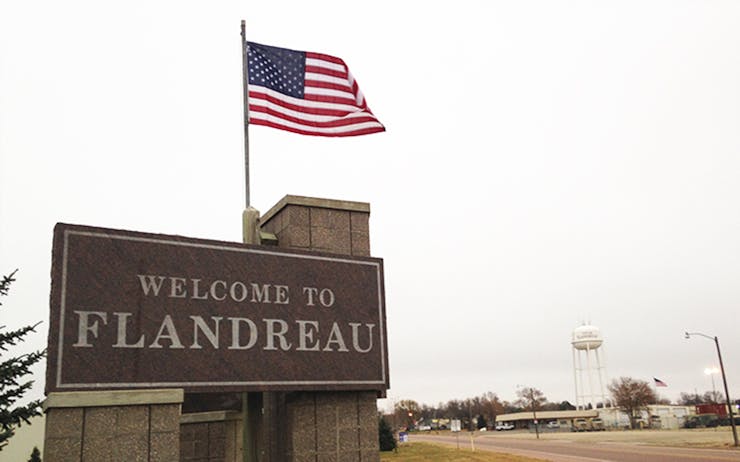On Friday morning, South Dakota prosecutors are expected to offer their opening arguments in a long-awaited trial against Eric Hagen, president and CEO of the Colorado cannabis consultancy Monarch America.
If convicted, Monarch America CEO Eric Hagen could face up to 15 years in prison for helping the Santee Sioux tribe set up their grow.
The case has drawn national attention and will be closely watched by leaders in both the cannabis industry and the Native American legal community. Issues of tribal sovereignty—and a potential precedent regarding the legal culpability of cannabis consultants—will play out in the old Moody County Courthouse, a small stone structure that sits lonely on a city block of grass in the county seat of Flandreau.
The trial, which could last three to four days, is expected to end the long-running saga of the Flandreau Santee Sioux tribe’s ill-fated cannabis lounge development.
In 2015, the tribe initiated an economic development project to grow cannabis and sell it at a new event center next to the Royal River Casino, which is on tribal reservation land. The tribe believed it had sovereign legal authority to do so under an October 2014 US Department of Justice policy directive known as the Wilkinson Memo. Hagen and his company were hired by the tribe to consult on cannabis growing and processing techniques. In late 2015, as the tribe’s crop grew toward maturity, word spread that a possible law enforcement raid was about to commence. Tribal officials voted to scuttle the project and burned their own crop in a dramatic midnight bonfire. (Leafly’s Bruce Barcott wrote this feature about the controversial project.)
Hagen, who is not a member of the tribe, was later arrested by state officials and charged for his participation in the project. No tribal member has been charged in relation to the cannabis operation.
State Attorney General Marty Jackley pressed for charges against Hagen. Jackley is expected to run for governor next year.
The stakes are high. Hagen, who was born and raised in South Dakota, faces cannabis-based charges that could result in a sentence of up to 15 years in state prison. The trial is considered important to the political future of South Dakota Attorney General Marty Jackley, who pressed his state prosecutors to bring charges against Hagen. Jackley is widely expected to run for governor in 2018, and has been outspoken in his opposition to the tribe’s cannabis project.
Hagen is charged with three felony counts. The Monarch America CEO is charged with one count of possession of more than 10 pounds of marijuana, one count conspiracy to possess more than 10 pounds of marijuana and one count of attempted possession of more than 10 pounds of marijuana.
Jonathan Hunt, the vice president of Monarch America, was also charged in the case. He reached a plea deal with the attorney general on a lesser charge of conspiracy to possess between one-half and one pound of marijuana.
That leaves Hagen to stand trial alone, with the Aberdeen, South Dakota, native facing a maximum sentence of 15 years if convicted of possession, 10 years on the conspiracy charge and a maximum of 7.5 years on the attempted possession charges. Charges against Hagen were announced last July by Jackley, who reached a plea agreement with Hunt before seeking an indictment against his partner. Hagen will now come face-to-face with his former vice president in a courtroom. As part of his plea deal, Hunt has agreed to testify as a cooperating witness for the prosecution.
The president of the Flandreau Santee Sioux tribe, as well as the tribe’s lawyer and members of the tribal council, were also named to a potential witness list. It’s unclear what testimony, if any, they might provide, with the threat of federal charges still looming.
Not an Indictment of the Tribe
At the announcement of the indictment, Moody County state’s attorney Paul Lewis said the charges were not an indictment of the tribe. But Lewis said he hoped that the charges against Hagen would prevent any future plans for a cannabis grow operation on tribal lands.
A state's attorney said he hopes the charges against Hagen prevent future plans for a tribal cannabis operation.
“I’m pleased with the results of this investigation,” Lewis said, “I’m pleased that there’s been an indictment issued, and I do sincerely wish that this upcoming election in the Santee Sioux tribe’s government this weekend, that strong considerations are given to what their future may look like, whether it is with or without, hopefully without, marijuana being present.”
All parties involved insist that this case is not about the tribe’s responsibility for the grow operation. But in the small farm town of Flandreau, it’s difficult for many locals to separate Hagen from the negative feelings many of them had about the proposed cannabis resort. That has turned this into a landmark case in terms of tribal sovereignty and how state laws apply to non-tribal members working on tribal cannabis operations.
Shop highly rated dispensaries near you
Showing you dispensaries nearThroughout the jury selection process, Hagen’s defense attorney repeatedly asked potential jurors about their individual concerns over the nature and legality of the proposed operation. Jurors were asked if they could separate feelings about the proposed cannabis growing facility and consumption lounge from the presumed guilt or innocence of the accused.
Locals With Bad Feelings About the Project
By the end of the day Thursday, five potential jurors had been dismissed for cause because of their personal negative feelings about the proposed project. One man was removed after being unable to answer when the judge asked if he would be able to presume the defendant innocent based on the nature of the case.
'Nobody in Flandreau wanted this project to happen.'
“As a juror you’re not supposed to (have a bias), I suppose,” another potential juror said, moments being dismissed by the defense. “Everyone in here probably has a bias in that way. Nobody here wanted this to happen,” he said, referring to the tribe’s cannabis project.
In the eyes of the state, though, this matter comes down a simple fact: Marijuana growth and cultivation is still illegal for non-natives within the borders of the state of South Dakota. And it was a point that deputy attorney general Bridget Mayer made sure to clarify in each of the three waves of jury selection on Thursday.
“Do you agree that we elect representatives and senators to go to Pierre and make the laws about what is best for our state?” she asked.
Due to the spirited nature of the jury selection process, the defense moved that each side be granted an additional two strikes from the jury pool, and the judge approved the motion. Through the ‘strike down’ phase, the pool of 38 applicants was eventually trimmed to 12 jurors and two alternates.
The trial is set to begin on Friday morning. Leafly will continue to follow the case throughout the week.





